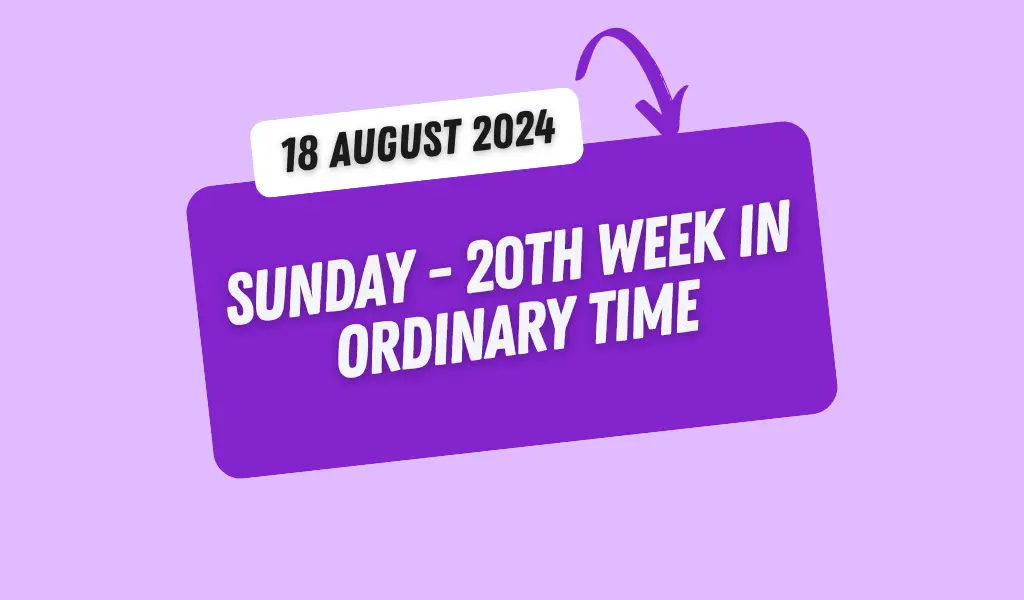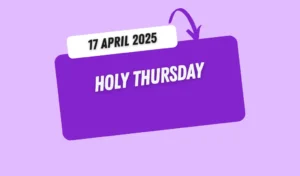Catholic Mass Readings and Reflection August 18, 2024
Twentieth Week of Ordinary Time
18th August 2024 (Sunday)
Psalter: Week 4
Reading of the Day
First Reading: Proverbs 9:1-6
Wisdom has built her house; she has hewn her seven pillars. She has slaughtered her beasts; she has mixed her wine; she has also set her table. She has sent out her young women to call from the highest places in the town, “Whoever is simple, let him turn in here!” To him who lacks sense she says, “Come, eat of my bread and drink of the wine I have mixed. Leave your simple ways, and live, and walk in the way of insight.”
Psalm 34:2-3, 10-11, 12-13, 14-15 (R. 9a)
R/. Taste and see that the Lord is good
Second Reading: Ephesians 5:15-20
Look carefully then how you walk, not as unwise but as wise, making the best use of the time, because the days are evil. Therefore do not be foolish, but understand what the will of the Lord is. And do not get drunk with wine, for that is debauchery, but be filled with the Spirit, addressing one another in psalms and hymns and spiritual songs, singing and making melody to the Lord with your heart, giving thanks always and for everything to God the Father in the name of our Lord Jesus Christ.
Gospel Acclamation
V/. Alleluia
R/. Alleluia
V/. He who feeds on my flesh and drinks my blood abides in me, and I in him, says the Lord.
R/. Alleluia.
Gospel : John 6:51-58
At that time: Jesus said to the crowds, “I am the living bread that came down from heaven. If anyone eats of this bread, he will live for ever. And the bread that I will give for the life of the world is my flesh.” The Jews then disputed among themselves, saying, “How can this man give us his flesh to eat?” So Jesus said to them, “Truly, truly, I say to you, unless you eat the flesh of the Son of Man and drink his blood, you have no life in you. Whoever feeds on my flesh and drinks my blood has eternal life, and I will raise him up on the last day. For my flesh is true food, and my blood is true drink. Whoever feeds on my flesh and drinks my blood abides in me, and I in him. As the living Father sent me, and I live because of the Father, so whoever feeds on me, he also will live because of me. This is the bread that came down from heaven, not like the bread the fathers ate, and died. Whoever feeds on this bread will live for ever.”
Daily Gospel Reflection
Sunday – Twentieth Sunday of Ordinary Time
Guidelines: Jesus, the Bearer of Life becomes the Giver of Life. One who possesses life, gives us the same life
1. Jesus recurrently reveals and declares himself as the Bread of life. First, there is a clear contrast between the manna of the past and the living bread. For that matter, there is an enormous contrast between worldly food and heavenly food.
2. The material food removes only the physical hunger, gives bodily strength, grants temporary satisfaction, and enhances the earthly life. But Jesus, the eternal bread of life, satiates the deep, interior spiritual hunger and thirst, fills with full strength, gives perpetual satisfaction, and fosters the Spirit-permeated life.
3. The focus and purpose is not on a self-revelation that ends in recognizing him as the Lord and worshipping him in faith. Rather, his self-assertion aims at the growth of the disciples’ faith in Him as the Eucharistic Lord.
4. This self-declaration unfolds both what he is and what he does to us. It is both personal and functional. Certainly he is the Bread of Life eternal. He is the giver of eternal life and as such, He gives us life. The focus is not on his identity but on how his identity has effects on us, how his identity of Eucharistic presence affects us. In simple how his identity changes our own identity.
5. The power-source that constantly sustains, nurtures and drives us ahead, is the communion with God. It is the divine communion that gives us power to life. To the extent that one is in communion with God, to that extent a new life becomes possible and meaningful.
6. Following is possible if and only if one is in communion with God, for we do not follow whom we do not know, or feel close. The communion between God and us is brought out so forcefully by the imagery of the the Bread of life (cf. Jn 6. 56-58).
7. Jesus continues to affirm, “I am the bread of life”. Those who receive this bread will experience three aspects: Life, Growth and Fruition. If there is no essential inseparable connection and communion between the Bread of life and the recipient, then there is no life, no growth and no fruition.
8. In other words, the threefold Eucharistic aspects are, Abiding in the Lord, living by the power of the Lord, and living forever.
“Living” in terms of Mutual Indwelling
If one is deprived of the nourishing bread, there is no life. The moment we are cut-off from God, there is no more vitality, no life-sap. The life-content from the Bread of Life flows into the one who receives and consumes it, there is life and mutual abiding.
From this it is very clear why today many are lifeless: it is because they do not receive the sustenance and nourishment from the eternal bread of life. It is because they do not abide in God and God does not abide in them. Instead they prefer to reside in sin and evil, and they close or crowd their inner chamber so much that either God cannot enter within or that He will feel suffocated to stay therein.
“Living by” in terms of Growth and Blossoming
The one who eats the bread, gets strength and grows. The communion fosters life and energy. One who is communed with God, be it the vine or the bread, grows from strength to strength, by the power and the vigour he derives.
From this it is again very clear, why today many do not blossom and grow, even after long years, even despite many human capacities and resources. In the case of many, growth is stifled, and they remain stagnant and sterile. It is only because they are not in communion with God – the vine and the bread of life.
“Living for eternity” in Productivity and abundant fruition
The one who gets nourished by the bread of life, in his strength, becomes productive and fruitful. In fact, these are the fruits of eternity and eternal life. One who lives in God, one who lives by God, will surely live forever.
Again from this it is clear why many today are not really productive and fruitful, even though they may be rated very successful in the sight of the world, and why many are lost for eternity, even though they may be great gains in the temporary, why many experience their life fruitless and joyless, even though they have many enjoyments and fruits of the world.
It is only because they do not live for eternity, they do not orient their lives towards eternity, they do not lead lives in eternal communion with God, in preference to temporary unions with many distractions and deviations of the world
Practice: Live because Jesus Lives!







